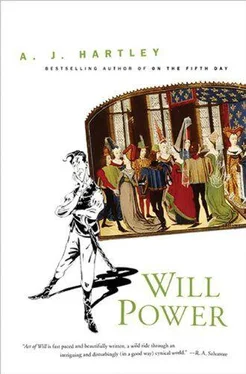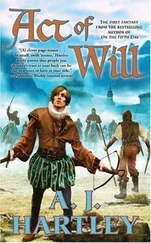A. Hartley - Will Power
Здесь есть возможность читать онлайн «A. Hartley - Will Power» весь текст электронной книги совершенно бесплатно (целиком полную версию без сокращений). В некоторых случаях можно слушать аудио, скачать через торрент в формате fb2 и присутствует краткое содержание. Год выпуска: 2010, Жанр: Фэнтези, на английском языке. Описание произведения, (предисловие) а так же отзывы посетителей доступны на портале библиотеки ЛибКат.
- Название:Will Power
- Автор:
- Жанр:
- Год:2010
- ISBN:нет данных
- Рейтинг книги:5 / 5. Голосов: 1
-
Избранное:Добавить в избранное
- Отзывы:
-
Ваша оценка:
- 100
- 1
- 2
- 3
- 4
- 5
Will Power: краткое содержание, описание и аннотация
Предлагаем к чтению аннотацию, описание, краткое содержание или предисловие (зависит от того, что написал сам автор книги «Will Power»). Если вы не нашли необходимую информацию о книге — напишите в комментариях, мы постараемся отыскать её.
Will Power — читать онлайн бесплатно полную книгу (весь текст) целиком
Ниже представлен текст книги, разбитый по страницам. Система сохранения места последней прочитанной страницы, позволяет с удобством читать онлайн бесплатно книгу «Will Power», без необходимости каждый раз заново искать на чём Вы остановились. Поставьте закладку, и сможете в любой момент перейти на страницу, на которой закончили чтение.
Интервал:
Закладка:
And then there was the beer. After the gnat’s piss they drank in Phasdreille, this was like liquid divinity. One was a lager, golden and sharp with a hoppy aftertaste that woke you up and suggested another mug. There was also an ale: nut-brown and rich with a hint of spice, like afternoon light on a leather chair. Lastly, there was a stout, full bodied and velvet-smooth, black and opaque with a head like fresh cream. I had one of each, and by the time I had gone back for seconds, I was slipping my arm around the shoulders of the meanest-looking goblins and suggesting we play some cards. I took another mouthful of the herbed pork, swilled it down with a gulp of ale, and the idea that these good fellows around me could possibly be the enemy faded like a memory from childhood. And in my inebriated state, oscillating between sublime insight and rank stupidity, the quality of the goblins’ beer seemed like a perfectly good reason to switch sides in a war.

The following morning, I still wasn’t sure if that last thought had been genius or insanity. Last night I had felt at one with the goblins and with the cosmos generally, which is something good beer often does to me. Today, waking bleary-eyed with a dull ache in my temples, cold in my bones, and with a company of goblins about me, some of whom still shot me looks that would have skewered a horse, I wasn’t so sure. In my lowest moments, I reflected that climbing into a leaky stone pit under a marsh with a goblin army, complete with its bear mounts and wolf scouts, was rather like smearing myself with honey and then sitting on a wasps’ nest, though these wasps had stingers several feet long. This wouldn’t have bothered me so much if the goblin community as a whole had been busily extending the hand of friendship, but no one wished me good morning and suggested hangover remedies. Nobody brought me breakfast, showed me the way to a freshwater spring outside in the swamp-forest, or told me where I could best relieve myself without nettling my bum. Conversations would peter out as I walked by, and small, slanted eyes would follow my path with, if not actual hostility, then at least suspicion. Once one of them muttered to his companion and felt the edge of his knife thoughtfully. I found myself walking aimlessly around and staying out of the way, afraid that falling asleep or bumping into someone would give them the opportunity or motive to slit me some new orifices. In the circumstances, how I felt about them hardly seemed relevant.
Orgos thought otherwise, but rather than lecture me himself, he called over a gaunt-looking goblin with brownish skin and lively green eyes. “This is Toth,” said Orgos. “He is a worthy soldier and a respected bear-rider. Mr. Hawthorne,” he said, turning to the goblin, “wants to know why your people do not regard him favorably.”
The goblin turned to me and shrugged expressively. “They see the way you look at them,” he said, in a gruff voice that sounded like it should come from a larger frame, “and they remember your attack on the Falcon’s Nest. Some of them may have respect for what you were trying to do, but it is grudging at best. You fought for their enemy, an enemy that has stolen everything from them and set out to wipe them out utterly. You can see why they are a little leery of you. Let me see your sword.”
I drew it, grateful for something that didn’t require me to speak. He peered at the blade.
“Yes,” he said. “One of ours, very old. The gilding on the hilt is new but the blade is excellent and will stand many reforgings should it take damage.”
“They don’t reforge,” I said. “They either grind them down or throw them away and get new ones.”
“Yes,” he said, and he looked sad somehow. “I know. Except, of course, that new really means old. Our ancestors forged these blades and few now have the skill to remake them-none, I think, in Phasdreille. Some of our men still have the skill, but since we left Phasdreille we have had neither the raw materials nor the equipment to make more than a few good blades a day. It is not enough. Meanwhile the enemy use the swords we stockpiled over decades and throw them away when they need repair.”
“Is that true of the stonemasons, too?” I asked. “I got the impression that most of the repairs to the city were sort of shoddy.”
The goblin called Toth nodded solemnly. “My people were once great builders,” he said. “Before the Arak Drül came-those you call the ‘fair folk’-we relied upon our hands and our wits, and we made fair and mighty things.”
“So how did they take over?” I demanded, feeling defensive.
“Guile,” he said. “Deception. And there is no doubting their military prowess. Their energies go into ornamentation and into war. They may not build castles or forge swords, but they have learned to use both as well or better than those who made them.”
I nodded. Ornamentation and war. The former for the bland, vapid entertainment which was designed to stir neither mind nor heart, and the latter to ensure that no one entered their world uninvited, and to make all other parts of the world look like theirs.
Toth wasn’t done. “They also had access to some power we did not recognize until it was too late,” he said. “We still don’t fully understand it, though I suspect it will come into play in the struggle which approaches. We welcomed them into our city because they seemed to have much to share with us, but by the time we realized how little substance there was to what they offered, strange things had already begun to happen.”
“What kind of strange things?”
“Most of the people around were like us, but many were different, their blood mixed with other races in generations past. It was not a problem, until the Arak Drül came, and then-almost overnight-it was a problem. Many who had stood with us turned against us, and a new hierarchy was established, one which centered on the pale, blond newcomers. Their king came to Phasdreille and there were enough people of his complexion that he soon took over. One night, the Pale Claw sect-a guild of Arak Drül assassins and politicians-led a series of raids. My people’s leaders were arrested, many were executed, and others were banished. From then on, the city became a dangerous place for us. Within a month, our property was being confiscated in accordance with the new laws, so we left the city: some fleeing, some driven out. We left with only the clothes on our backs, and the Arak Drül chased us to the mountains, butchering all they could. They took the city-our city, generations in the making-and all it contained, without fighting a single real battle.”
He smiled bleakly and made his little half-shrug again, so that his head bobbed and his eyebrows raised a little. It was an alarmingly human gesture.
“This Pale Claw sect,” I said. “They attacked me in the city. As did some of. . your people.”
“There is something about your presence here that I don’t fully understand,” said the goblin. “For years now it has been rumored that Outsiders, neither my people nor what you call the fair folk, would play a decisive role in the war. Many here see you as those Outsiders, and while this gives some of us hope, it scares others. Factions on both sides of the war feel it is best to destroy you, while others seek to draw you into their respective camps to help them to victory. Garnet and Renthrette have been wooed by the Arak Drül as Orgos and Mithos have been wooed by us. Lisha was hidden until very recently. That left you, and your position was-perhaps still is-unclear to both sides, making you a target to both.”
“If the ‘fair folk,’ or whatever you called them, the. .”
“Arak Drül.”
Читать дальшеИнтервал:
Закладка:
Похожие книги на «Will Power»
Представляем Вашему вниманию похожие книги на «Will Power» списком для выбора. Мы отобрали схожую по названию и смыслу литературу в надежде предоставить читателям больше вариантов отыскать новые, интересные, ещё непрочитанные произведения.
Обсуждение, отзывы о книге «Will Power» и просто собственные мнения читателей. Оставьте ваши комментарии, напишите, что Вы думаете о произведении, его смысле или главных героях. Укажите что конкретно понравилось, а что нет, и почему Вы так считаете.












